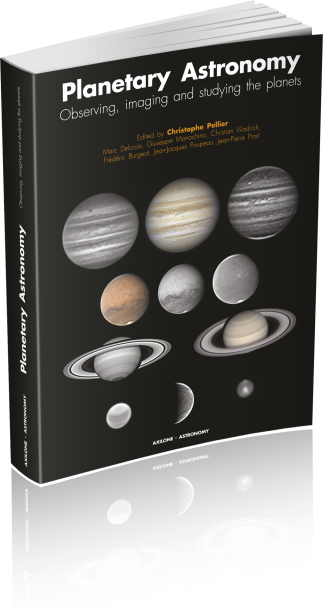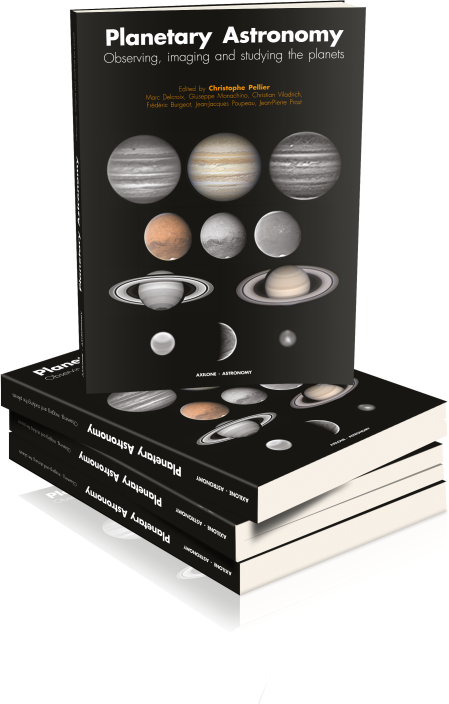What instrument should I buy, is the one I already own fine for planets?
How do I set correctly my camera to image planets?
How much should I process my images?
Using WinJupos, should I use video or image derotation?
I wonder what was this very strange detail on Jupiter last night…
How can I make scientifically valid analyses of my data?
If you ever ask yourself any of these questions (and many others…) you have certainly already looked for informations on the web, or ask people on forums. There are a lot of free good information on internet (… like this blog!), and many observers are skillful and ready to help you but…
- Information is highly scattered throughout the net, and is not organized
- Forums are made for people to share ideas or experiences. But then everyone is likely to post and you have no guarantee that they know what they are talking about, and no guarantee that the persons who have the correct answer will even see your topic!
In other words, you are losing time looking for information better than having the best advices at hand to simply enjoy your observations!
Planetary Astronomy is a comprehensive book about observing, imaging, and studying planets. It has been written under my direction by seven authors, all being skillful amateur observers in their respective domains: Christian Viladrich, Marc Delcroix, Jean-Jacques Poupeau, Frédéric Burgeot, Giuseppe Monachino, and Jean-Pierre Prost. This is a translation of the book Astronomie planétaire who is a great success in France since 2015.
With Planetary Astronomy you will learn to:
Make the best use of your equipment: choosing an instrument, setting correctly the optics of the telescope, setting the camera, using planetary filters, train your eye to see all possible details at the eyepiece
Anticipate weather and seeing conditions, not to lose any good night
Use in depth the best planetary softwares: Autostakkert!, Registax, and WinJupos, how to objectively process details and colors
Identify features on planets: each of the seven planets (but Earth of course) has a detailed chapter that will help you to anticipate cycles of activity on Jupiter, recognize dust storms on Mars, detect bright storms on Uranus or Neptune
Analyse your data to go beyond simple observations: measuring position and details drifting on planets, making cartographies, participate to advanced observing projects including cooperation with scientists.



44 Comments
Hello Olav,
I’m sorry that the fees costed that much. The book is much too large en dense to be put in e-format (not from a technical, but practical, point of view – I would personaly dislike to read it online) and it would be too easy to be shared…
I encourage you to pick the book if you can, it contains several decades of experience from the 7 co-authors, if you think of it, the cost of knowledge is not that high ;) cameras and telescopes are much more expensive !
So the book arrived, I ordered, and I’m sure the content is well edited after these years.
No ebook though, no easy notes/bookmarks/search.
Since the import fees turned out to be more than the cost of the book, I’m not going to pick it up at the post office. Would have paid more for an ebook to avoid all the hassle.
Consider it a donation. Will check back for your excellent articles from time to time.
Thanks for the reply Christophe. You are always so responsive!
I do have the Dupont-Bloch book and it is great – authoritative and comprehensive. But my thinking was for a short introductory section in your book to help people get started. When I started a few years ago I struggled at first even to land the planet on the sensor! There is so much to try and master in imaging at the start! When I got frustrated, it was always possible to return to the Moon, being easier to find, and be able to get some useful images. Thus the Moon was a very easy, basic starting project that allowed me to build my skills. That is why I was suggesting a short “getting started” section -not as a replacement for specialized books like that of Dupont-Bloch, but as an entry point for your book.
Best regards
Mark
Hello Mark, many thanks!
About the index: yes, you’re not the first one to ask for it. On a next edition, we should certainly add one.
About the Moon… I understand your point. We have excluded it though, mainly because nowadays, this is an object that deserves a full book just for itself. Having just a chapter would not have been satisfaying. Same story for the asteroids or comets, that traditionnaly have been included in the perimeter of similar past books… Moreover, the equipment, and observing and processing technics, can be different from that for planets.
I am not a lunar observer but I know there are some Moon books available, one very recent and that might match the needs is “Shoot the Moon” written by Nicolas Dupont-Bloch at Cambridge University Press, 2016, that has been translated to french and included in the Axilone collection (this means that it is good :) ). It is easy to find.
Hi Christophe,
I am very pleased with the book, and recommend it to lots of folk. It is rich in insight and deeo technical knowledge.
You have asked for feedback here on the book. My suggestions are:
(1) that an index would be extremely helful in navigating the book; and
(2) I think many people would appreciate a chapter on capturing and processing lunar images. The Moon is an entry point for many planetary imagers, for obvious reasons, but it can be surprisingly difficult to process well. Your book is so comprehensive in its coverage that the absence of the Moon is quite noticeable.
Anyway, congratulations on an excellent book.
Best wishes
Mark
Hello Stu, many thanks for your enthusiasm! I’m sure you will enjoy the book !
Hi Chris
IT ARRIVES!!!!!!!!
For 4 years I have waited for today.Your book which I ordered on the 24th of Dec arrived in the post this morning.Holy cow.I rushed to the post box to hold the book for the first time.I was so excited I ripped open the package and there it was….The English ver of Planetary Astronomy.WOW its heavy.It looks so cool.I flicked through the pages and smelt the new book smell…WOW again the information its going to take a long time to get through.So looking forward to getting stuck in.
All I can say is thank you so much.I look forward to keeping in touch in the future and really improving my imaging.
Thanks again Chris fantastic effort.Its worth the wait!!!!!!!!
The book is now available :) links have been added so you can go to its website and order it!
Hi all, I’m on the very last corrections!
I am looking forward to reading your book. When will be the expected date of publicationa nd I would like to order one.
Any updates on the English release?
Hi Conrado,
I hope it will not last long now. I need only a last correction.
Christophe
Hi Chris, is the English version avaiable ? Thanks and regards !
Hi Almir, I’m currently motivating my editor to have it available for the coming summer… hopefully. Thanks Christophe
Hy Chris, some news about the english version of the book? thanks again
Hi Almir, not yet, still working on it, many thanks for your message…
Hello Chris, the english edition is ready:^]
Thanks
Hello Stu, it will be a hard copy only.
Hi CHRISTOPHE
Will there be a online ver of the book or hard copy only
Thanks
Stu
Hi Eric, we are still modifying the text. Part 2 and 3 will be ready on the next reading from my side, and maybe the first one will still ask again for some marginal corrections.
Hello Christophe, Any update on a publication date for the English version?
Countaing the days Cristophe!
Hi guys, I had to revise in depth the translation. My editor is correcting the first issue of the layout. I will have to validate this last one and soon after, we will be able to send it to print…
Hi Christophe
I have heard that your book is close to be finished for English .This will be fantastic how are we able to order.
Many thanks
Stu Parker
Hi Christophe,
Any progress on the English version? Or do I need to brush on my scientific French et juste acheter la version française?
Hi, got the English version any soon? Would prefer ebook. How about selling an “early access” version, having the final work whenever ready?
French version ebook then?
Hi Nalin, over the coming weeks, we’re about to work on the first layout of the english issue. So the book is not close to be available yet, but work is still in progress :)
Hi,
Any news on the English edition yet? Thanks for your excellent efforts on research and sharing of your knowledge. Great Blog.
Hi Frank,
Not yet, but things are doing well. The first issue of the translation has been sent to the authors and we are currently reviewing it. Thanks for your interest!
February 23, 2017
English version available yet ?
Hi Olav,
The translation has begun a bit later than we thought but it will be done. So don’t worry you won’t have to buy the french issue :)
Hi Chris,
Websearch keep sending me to your site, great articles every time :)
Really curious about the book though.
This translation dragging out, does it eventually mean I have to recap my French from school?
Hello Erik,
So far there is no date of publication… the translation is just at the beginning.
Thanks for your interest :) I will have one or two more ASI224 articles until the end of the year.
Hi Chris,
I’m looking forward to this book! Can you tell yet when it will be available in english?
Like your articles about the ASI224MC.
all the best,
Erik
Thanks Fulvio :)
Hi Chris, wonderful book! I certainly must have one copy!
Thanks Stu :)
Hi Christophe,
So looking forward to this book thanks so much for this web page looking forward to improve my imaging in the coming years
All the best
Stu
Thanks Neil :)
Looking forward to its publication – can’t wait to get my hands on a copy
Thanks Robert :)
Will definitely be getting a copy, very excited to see this in english :)
Thanks Conrado, hope it will be available soon!
Hi, Chris , very good news, I´l certainly MUST have one ! (in the English version).
All the best